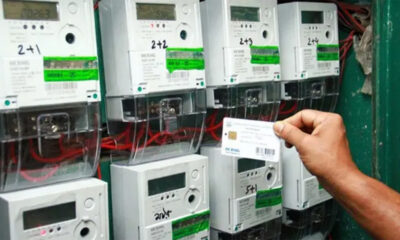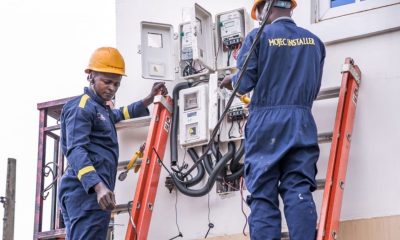Business
Businesses may crumble as FG approves 50% electricity tariff hike

More small-scale businesses may suffer as the Nigerian Electricity Regulatory Commission has approved over 50 per cent increase in electricity tariff.
The new tariff regime to be paid by customers of the 11 electricity distribution companies will take effect from January 1 this year.
This is coming about two months after NERC forced the implementation of an earlier hike in electricity tariff despite opposition against it.
Already, many businesses have not recovered from the twin-tragedy of COVID-19-induced months of lockdown and #EndSARS protests hijacked by hoodlums that massively looted and vandalised companies across the country.
NERC announced the latest tariff hike in its December 2020 minor review of the Multi-Year Tariff Order and Minimum Remittance Order obtained in Abuja on Tuesday.
The MYTO order containing the latest tariff hike, Order NERC/225/2020, was signed by the new Chairman of NERC, Sanusi Garba, superseding the previous Order NERC/2028/2020.
The commission explained that it considered the 14.9 per cent inflation rate rise in November 2020 and foreign exchange of N379.4/$1 as of December 29, 2020 before approving the new rate.
Others factors considered, according to NERC, are available generation capacity, the United States inflation rate of 1.22 per cent and the capital expenditure of the power firms.
The revised Service-Based Tariff saw an increase in the rates payable by the various classes of electricity users unlike that of November 2020 that exempted low electricity consumers.
The commission also stated that the new tariff would be effective till June 2021 while a Cost Reflective Tariff would be activated from June to December 2021.
The commission said last month that it was carrying out a review for another tariff.
In September last year, the commission raised electricity tariff but this was faced with stiff opposition by the organised labour, as the unions threatened to embark on a nationwide strike.
After a series of negotiations, the tariff was reduced based on consumer classes and the hours of power supply.
On November 1, 2020 the Discos commenced the implementation of the revised electricity tariff that was jointly agreed upon by organised labour and the Federal Government.
Railway
Lagos Rail Mass Transit part of FG free train ride – NRC

Lagos Rail Mass Transit part of FG free train ride – NRC
The Nigerian Railway Corporation (NRC) has disclosed that the Lagos Rail Mass Transit (LRMT) trains are included in the Federal Government’s free train ride initiative for the Christmas and New Year celebrations.
The LRMT, which currently includes the Phase 1 Blue Line Rail and the Phase 1 of the Red Line Rail, operates under the Lagos Metropolitan Area Transport Authority (LAMATA).
This announcement was made by Ben Iloanusi, the Acting Managing Director of the NRC, during an interview on NTA News TV on Friday, following the launch of the initiative earlier that day.
While Iloanusi stated that Phase 1 of both the Blue Line and Red Line Rail projects are part of the program, LAMATA has yet to confirm this inclusion.
READ ALSO:
- Nigeria denies alleged plot to destabilise Niger Republic
- Navy arrests 19 Nigerians attempting to reach Europe by hiding on ship
- Troops arrest four Ambazonian rebels in Taraba
Iloanusi outlined the other routes benefiting from the scheme, which include the Lagos-Ibadan Train Service, Kaduna-Abuja Train Service, Warri-Itakpe Train Service, Port Harcourt-Aba Train Service, and the Bola Ahmed Tinubu Mass Transit in Lagos. Notably, little was previously known about the Bola Ahmed Tinubu Mass Transit service until this disclosure.
“Let me mention the routes where this free train service is happening. We have the Lagos-Ibadan Train Service, we have the Kaduna-Abuja Train Service, we have the Warri-Itakpe Train Service, we have the Lagos Rail Mass Transit trains, we have the Port Harcourt-Aba Train Service, and we have what we call the Bola Ahmed Tinubu Mass Transit, which is also in Lagos,” he stated.
Iloanusi provided operational updates, stating that passengers nationwide can access free tickets online or, for those unable to do so, at train stations where they will be profiled and validated.
He noted that passengers using NRC-managed services (excluding the Lagos Rail Mass Transit) should reserve tickets via the official website, www.nrc.gov.ng, with a valid ID required. He also advised travelers to plan, arrive on time, and bring valid identification.
Lagos Rail Mass Transit part of FG free train ride – NRC
Business
NNPC denies claim of Port Harcourt refinery shutdown

NNPC denies claim of Port Harcourt refinery shutdown
The Nigerian National Petroleum Company Limited (NNPCL) has denied claims in media reports that the newly refurbished Port Harcourt refinery has shut down.
The national oil company denied the claim in a press release issued by its Chief Corporate Communications Officer, Olufemi Soneye, on Saturday.
Soneye said the claim was false and urged Nigerians to disregard it. He stressed that the Port-Harcourt Refinery is fully operational.
READ ALSO:
- Like Ibadan, stampede claim 10 lives for Abuja Catholic church, 17 in Anambra
- Marketers react after NNPCL slashes petrol price to N899 per litre
- Electricity: We installed 184,507 meters, issued 50 licences in Q3, says FG
The statement read, “The attention of the Nigerian National Petroleum Company Limited (NNPC Ltd.) has been drawn to reports in a section of the media alleging that the Old Port Harcourt Refinery which was re-streamed two months ago has been shut down.
“We wish to clarify that such reports are totally false as the refinery is fully operational as verified a few days ago by former Group Managing Directors of NNPC.”
He noted that preparation for the day’s loading operation is currently ongoing, and added that claims of the shutdown are “figments of the imagination of those who want to create artificial scarcity and rip-off Nigerians.”
NNPC denies claim of Port Harcourt refinery shutdown
Business
CBN permits BDCs to buy up to $25,000 FX weekly from NFEM

CBN permits BDCs to buy up to $25,000 FX weekly from NFEM
The Central Bank of Nigeria (CBN) has granted Bureau de Change (BDC) operators temporary permission to purchase up to $25,000 weekly in foreign exchange (FX) from the Nigerian Foreign Exchange Market (NFEM).
The Central Bank of Nigeria (CBN) has granted Bureau de Change (BDC) operators temporary permission to purchase up to $25,000 weekly in foreign exchange (FX) from the Nigerian Foreign Exchange Market (NFEM).
This move, detailed in a circular dated December 19, 2024, is designed to meet seasonal retail demand for FX during the holiday period.
The circular was signed by T.G. Allu, on behalf of the Acting Director of the Trade and Exchange Department.
The arrangement will be in effect from December 19, 2024, to January 30, 2025.
Under the directive, BDCs may purchase FX from a single Authorized Dealer of their choice, provided they fully fund their accounts before accessing the market.
Transactions to occur at the prevailing NFEM rate
The transactions will occur at the prevailing NFEM rate, and BDCs are required to adhere to a maximum 1% spread when pricing FX for retail end-users.
READ ALSO:
- Badenoch’s negative portrayal of Nigeria Police unfair-PCRC
- Bitcoin price crashes to $95,000 as market continues to react to Federal rate cuts
- Bauchi high court dismisses blasphemy, cybercrime charges against Rhoda Jatau
All transactions conducted under this scheme must be reported to the CBN’s Trade and Exchange Department.
The circular read in part:
“In order to meet expected seasonal demand for foreign exchange, the CBN is allowing a temporary access for all existing BDCs to the NFEM for the purchase of FX from Authorised Dealers, subject to a weekly cap of USD 25,000.00 (Twenty-five thousand dollars only).
This window will be open between December 19, 2024 to January 30, 2025.
“BDC operators can purchase FX under this arrangement from only one Authorized Dealer of their choice and will be required to fully fund their account before accessing the market at the prevailing NFEM rate. All transactions with BDCs should be reported to the Trade and Exchange department, and a maximum spread of 1% is allowed on the pricing offered by BDCs to retail end-users.”
The CBN assured the general public that PTA (Personal Travel Allowance) and BTA (Business Travel Allowance) remain available through banks for legitimate travel and business needs.”
These transactions are to be conducted at “market-determined exchange rates” within the NFEM framework.
This initiative reflects the CBN’s strategy to stabilize the FX market and manage seasonal surges in demand.
CBN permits BDCs to buy up to $25,000 FX weekly from NFEM
-

 Railway1 day ago
Railway1 day agoLagos Rail Mass Transit part of FG free train ride – NRC
-

 metro2 days ago
metro2 days agoCourt stops customs from seizing imported rice in open market
-

 metro8 hours ago
metro8 hours agoWhy we displayed ‘Jesus Christ is not God’ banner at Lekki mosque -Imam
-

 metro3 days ago
metro3 days agoIbadan stampede: Tinubu orders probe as death toll hits 40
-

 metro2 days ago
metro2 days agoIbadan stampede: Ooni reacts after arrest of ex-wife
-

 metro2 days ago
metro2 days agoAfe Babalola: Court grants Dele Farotimi bail, barred from media interviews
-

 metro1 day ago
metro1 day agoNIMC warns against extortion, reaffirms free NIN enrollment
-

 News3 days ago
News3 days agoAdebayo Ogunlesi, 2 other Nigerians make Forbes 50 wealthiest Black Americans list 2024








You must be logged in to post a comment Login